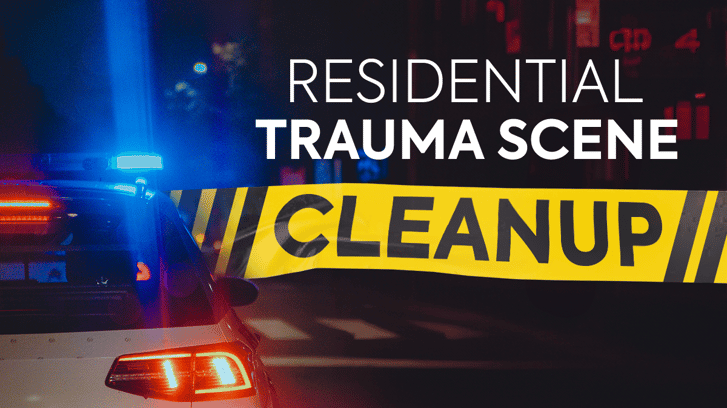Restoration
Residential Trauma Scene Cleanup: A Step-by-Step Professional Approach

Trauma scene cleaning is a critical service that often goes unnoticed. But it plays a pivotal role in helping individuals and families cope with the aftermath of distressing events. Restoration professionals who perform this service are entrusted with the responsibility of not only restoring the physical space, but also providing emotional support.
Types of Trauma Scenes You May Encounter
Residential trauma scenes vary widely in nature and severity, and you and your team must be prepared to encounter a diverse range of situations. Here are some common types of trauma scenes you may face:
- Accidents
- Crime scenes
- Clandestine drug or meth labs
- Infectious disease outbreaks
- Serious hoarding and otherwise foul situations
- Sewage backups
- Suicides
- Unattended natural and accidental deaths
The Importance of Compassion and How to Go About It
When faced with the aftermath of traumatic events, you and your crew can play a crucial role in helping families and individuals regain their sense of security and normalcy.
Families and individuals affected by traumatic events are often in a state of shock, grief, or distress. Therefore, they rely on restoration professionals for both physical cleanup and emotional support. Here's how to exhibit compassion in this line of work:
- Demonstrate Active Listening – Take the time to listen to the concerns and needs of the affected individuals. Encourage them to share their thoughts and feelings.
- Display Empathy – Put yourself in their shoes. Acknowledge their pain and offer reassurance that you understand the difficulty and emotional distress of their situation.
- Communicate Clearly – Keep communication open and honest. Explain the cleanup process and what to expect, addressing any questions or concerns they may have. This transparency builds trust.
- Strive for Efficiency – Complete the cleanup as quickly as possible, while also ensuring thoroughness.
- Respect Boundaries – Work discreetly, and respect the privacy and dignity of those affected. Be mindful of their emotional state, avoid intrusive questions, and allow them space when needed. Also, avoid sharing sensitive details of the scene with others outside the home.
- Offer Resources – Provide information on support services, such as counseling or support groups that are available. Sometimes, connecting them with professionals who specialize in trauma counseling can be immensely beneficial.
The Importance of Professionalism and How to Exhibit It
Professionalism is essential in trauma scene cleanup. Being professional ensures that the job is done efficiently, safely, and with the utmost respect for the property and its occupants. Here's how you can maintain professionalism throughout your work:
1) Invest in Comprehensive Training and Certification for Yourself and Your Team – This not only ensures you are equipped to handle various trauma scenes, it also instills confidence in your clients.
2) Ensure Timeliness – Respond promptly to calls for trauma scene cleanup. Timely service can alleviate the distress of the affected parties and prevent further damage to the property.
3) Check in with Local Authorities – This is an important step before you even set foot on the site of a trauma scene. You’ll want to communicate with any local authorities who arrived before you, to learn about the potential hazards inside.
4) Help Investigators – Get their input before you begin working, to identify any forensic evidence you should avoid touching during the cleanup process.
5) Adhere to ANSI/IICRC 540 – This standard defines criteria and methodology used for inspecting and investigating blood and other potentially infectious material (OPIM) contamination and for establishing work plans and procedures. The standard also describes the procedures to be followed by profesisonals and the precautions to be taken when performing trauma and crime scene cleanup regardless of surface, item or location.
6) Comply with Regulations – Follow all local, state, and federal regulations regarding biohazard cleanup and disposal procedures. Compliance is non-negotiable in this field.
7) Use Proper Equipment – Make sure you have the appropriate personal protective equipment (PPE) and cleaning tools for every job. This safeguards the health of you and your team, and also demonstrates your commitment to the safety of others.
8) Document Everything – Maintain meticulous records of the job site and your work:
- Use a floor plan app, such as magicplan, to create detailed floor plan sketches.
- Attach photos of the scene.
- Insert detailed notes about decontamination, cleaning and disposal procedures to be used.
- Document your results with additional photos and notes.
- Then use your floor plan app to create a professional report seamlessly and rapidly. This documentation can be vital for insurance claims and legal purposes.

Tips for Achieving a Delicate Balance of Compassion and Professionalism
When you work as a trauma scene cleaner, striking a balance between compassion and professionalism can be challenging. Yet it is essential for the successful resolution of traumatic events. Here are some practical tips for achieving this delicate equilibrium:
- Establish Clear Boundaries – Define your role and responsibilities clearly from the outset. Let clients know what you can and cannot do.
- Maintain Emotional Resilience – While it's essential to empathize with clients, it's equally crucial to maintain emotional resilience. Trauma scenes can be emotionally taxing, so it's essential to take care of your own mental health.
- Communicate with Your Team – Ensure they understand the importance of compassion and professionalism. Encourage open communication and provide guidance on handling sensitive situations.
- Keep Learning – Stay updated on the latest industry trends and best practices. This not only enhances your technical skills, but also develops your ability to handle emotional situations with compassion.
- Seek Support – Don't hesitate to seek support or counseling for yourself or your team members when dealing with particularly distressing trauma scenes. It's okay to ask for help.
Summary
Residential trauma scene cleanup is a demanding profession that requires a unique blend of compassion and professionalism. So, if you are hired to handle trauma scene cleanup jobs, your assignment is always two-fold: You must address the cleanup of physical messes, while also helping people cope with the tragedy of traumatic events. By maintaining professionalism while also exhibiting compassion, you can make a profound difference in the lives of those you serve. Your work is undeniably essential in helping individuals and families heal and move forward after adversity.
READ MORE:
Specializing in Residential Biohazard Cleanup: Services Explained
Related articles
featured
/Restoration
The Definitive Restoration Workflow Guide: How to Make Every Job Flow Seamlessly
featured
/Restoration
6 Tips for Optimizing Restoration Data Privacy (and Why That Matters)
featured
/Claims Adjuster
/Restoration
Scope of Work vs. Estimate: What’s the Difference in Restoration?

Zuzanna Geib
Team Lead Marketing
